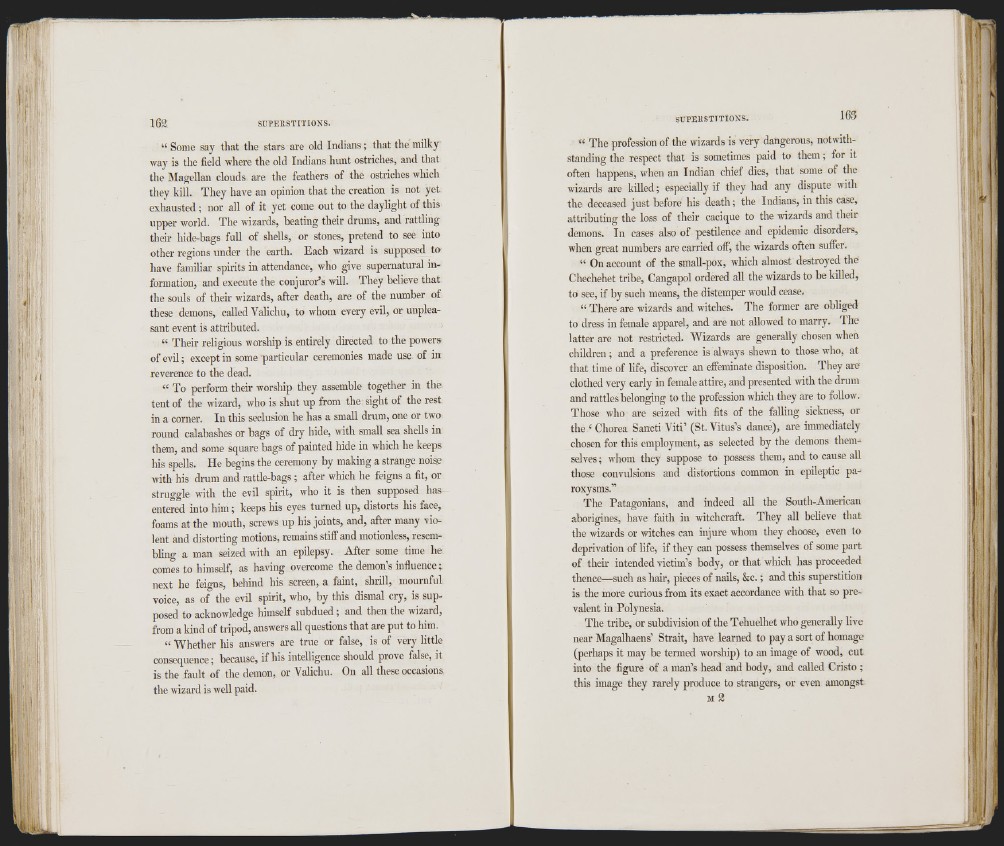
' 7
7- 'íi
I
; í
I¡ i r :Í y M,
!' 'rf'':- l.
7i¡
1G2 SUPERSTITIONS.
“ Some say that the stars are old Indians; that the milky
way is the field where the old Indians hunt ostriches, and that
the Magellan clouds are the feathers of the ostriches which
they kill. They have an opinion that the creation is not yet
exhausted; nor all of it yet come out to the daylight of this
upper world. The wizards, beating their drums, and rattling
their hide-bags full of shells, or stones, pretend to see into
other regions under the earth. Each wizard is supposed to
have familiar spirits in attendance, who give supernatural information,
and execute the conjuror’s wül. They believe that
the souls of their wizards, after death, are of the number of
these demons, called Valichu, to whom every evil, or unpleasant
event is attributed.
“ Their religious worship is entirely directed to the powers
of evU; except in some particular ceremonies made use of in
reverence to the dead.
“ To perform their worship they assemble together in the.
tent of the wizard, who is shut up from the sight of the rest
in a corner. In this seclusion he has a small drum, one or two
round calabashes or bags of dry hide, with small sea shells in
them, and some square bags of painted hide in which he keeps
his spells. He begins the ceremony by making a strange noise
with his drum and rattle-bags ; after which he feigns a fit, or
struggle with the evil spirit, who it is then supposed has
entered into him; keeps his eyes turned up, distorts his face,
foams at the mouth, screws up his joints, and, after many violent
and distorting motions, remains stiff and motionless, resembling
a man seized with an epilepsy. After some time he
comes to himself, as having overcome the demon’s influence;
next he feigns, behind his screen, a faint, shrill, mournful
voice, as of the evil spirit, who, by this dismal cry, is supposed
to acknowledge himself subdued ; and then the wizard,
from a kind of tripod, answers all questions that are put to him.
“ Whether his answers are true or false, is of very little
consequence; because, if his intelligence should prove false, it
is the fault of the demon, or Valichu. On all these occasions
the wizard is well paid.
“ The profession of the wizards is very dangerous, notwithstanding
the respect that is sometimes paid to them; for it
often hapjiens, when an Indian chief dies, that some of the
wizards are killed; especially if they had any dispute with
the deceased just before his death; the Indians, in this case,
attributing the loss of their cacique to the wizards and their
demons. In cases also of pestilence and epidemic disorders,
when great numbers are carried off, the wizards often suffer.
“ On account of the small-pox, which almost destroyed tlie
Chechehet tribe, Cangapol ordered all the wizards to he killed,
to see, if by such means, the distemper would cease.
“ There are wizards and witches. The former are obliged
to dress in female apparel, and are not allowed to marry. 1 he
latter are not restricted. Wizards are generally chosen when
children ; and a preference is always shewn to those who, at
that time of life, discover an effeminate disposition. They are
clothed very early in female attire, and presented with the drum
and rattles belonging to the profession which they are to follow.
Those who are seized with fits of the falling sickness, or
the ‘ Chorea Sancti Viti’ (St. Vitus’s dance), are immediately
chosen for this employment, as selected by the demons themselves
; whom they suppose to possess them, and to cause all
those convulsions and distortions common in epileptic paroxysms.”
The Patagonians, and indeed all the South-American
aborigines, have faith in witchcraft. They all believe that
the wizards or witches can injure whom they choose, even to
deprivation of life, if they can possess themselves of some part
of theft intended victim’s body, or that wliich has proceeded
thence—such as hair, pieces of nails, &c.; and this superstition
is the more curious from its exact accordance with that so prevalent
in Polynesia.
The tribe, or subdivision of the Tehuelhet who generally live
near Magalhaens’ Strait, have learned to pay a sort of homage
(perhaps it may be termed worship) to an image of wood, cut
into the figure of a man’s head and body, and called Cristo ;
this image they rarely produce to strangers, or even amongst
M 2
l|V' :
■il il
:■ 'h